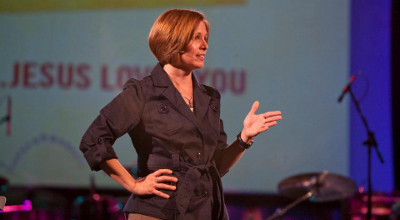 Two years ago, I sat in on a breakout session led by Joy Bowen at Orange Conference 2011. Within the first five minutes she used the word ‘copious.’
Two years ago, I sat in on a breakout session led by Joy Bowen at Orange Conference 2011. Within the first five minutes she used the word ‘copious.’
I was hooked.
Joy’s topic focused on mobilizing kids and youth to lead in the context of the weekend worship services. And her first point of business was to ask:
What’s the difference between a student leader & a student helper?
That’s a great question that should be applied to any volunteer of any age. But for the sake of this topic … it’s simply a smart first step to establishing a system.
Mobilizing kids and students to lead in your ministry is not only a cultural theme you want woven into your ministry but it’s a matter of stewardship, as well. I walked away from Joy’s session with a sense of conviction for what needs to be done in fpKIDS.
You see, we have tweens and students serving in kids ministry and many do a phenomenal job. However, I cannot say that we do this with a great deal of intentionality. But these two statements shifted my thinking…
- People are wired to discover our passions and gifts—even kids and students.
- We are called to be an advocate to help kids and students discover their passions & gifts.
But in order to maximize this you’ve got to have 2 things:
- An Intentional System
- An All-Staff approach. It’s cultural.
The system begins with:
1. Defined roles. What is the difference between a leader and a helper? Here are Joy’s thoughts:
- Empowered vs Needs lots of direction
- Confident vs Uncertain
- Competent vs Unskillful
- Inspiring vs Discouraging
- Displays Emotional Intelligence vs Reacts on Emotion
2. Established Trust. Do we trust kids & students to own pieces of the ministry? In order for them to feel significant they’ve got to have something significant to do. We’ve got to learn to trust.
They’ve got to trust us. Why? Because we have a responsibility to protect kids/students from placing them in situations they are not ready for. Empowering youth to serve is not a way to fill holes in your schedule, but a way to help raise up spiritually engaged young adults.
3. Equip. Equipping kids/students to lead completes the picture. We can recruit all day long but until we equip we only set them up for failure. Joy recommends the following steps:
- Find out how they’re wired. What are their strengths?
- Create clear expectations for accountability
- Observation: Using the 4 Week ‘Exponential’ model, kids/students are coached and given feedback on their own leadership.
Our goal is to design environment where they not only sense God, but they experience what God wants to do through them.
Gina McClain is a speaker, writer and children’s ministry director at Faith Promise Church in Knoxville, Tenn.
For the original article, visit ginamcclain.com.
Get Spirit-filled content delivered right to your inbox! Click here to subscribe to our newsletter.
Dr. Mark Rutland's
National Institute of Christian Leadership (NICL)
The NICL is one of the top leadership training programs in the U.S. taught by Dr. Mark Rutland. If you're the type of leader that likes to have total control over every aspect of your ministry and your future success, the NICL is right for you!
FREE NICL MINI-COURSE - Enroll for 3-hours of training from Dr. Rutland's full leadership course. Experience the NICL and decide if this training is right for you and your team.
Do you feel stuck? Do you feel like you’re not growing? Do you need help from an expert in leadership? There is no other leadership training like the NICL. Gain the leadership skills and confidence you need to lead your church, business or ministry. Get ready to accomplish all of your God-given dreams. CLICK HERE for NICL training dates and details.The NICL Online is an option for any leader with time or schedule constraints. It's also for leaders who want to expedite their training to receive advanced standing for Master Level credit hours. Work through Dr. Rutland's full training from the comfort of your home or ministry at your pace. Learn more about NICL Online. Learn more about NICL Online.


